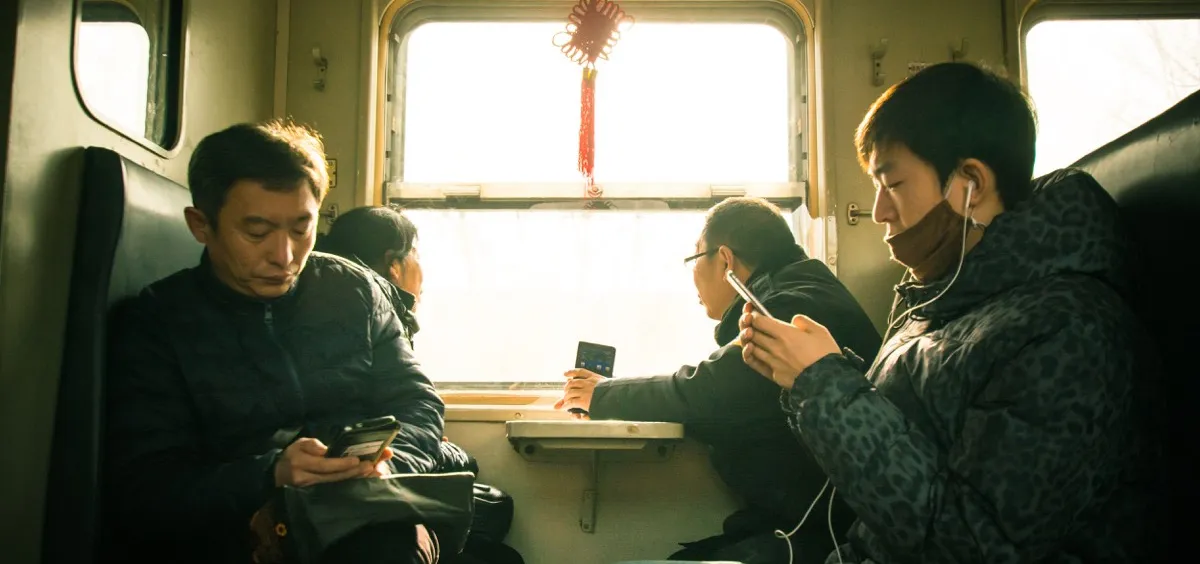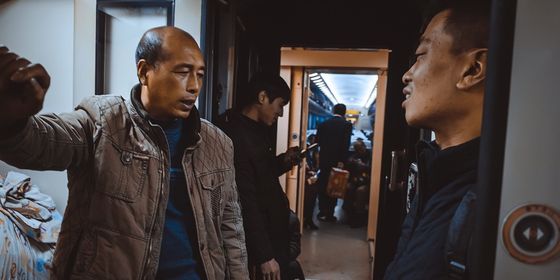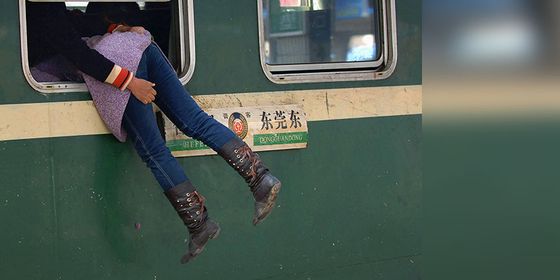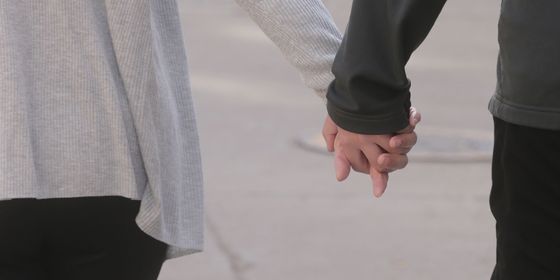Memories of homecoming and misadventure during China’s busiest travel season
This story is published as part of TWOC’s new collaboration with Story FM, one of the most renowned storytelling podcasts in China. In January, Story FM collaborated with the audio platform Himalaya to collect listeners’ anecdotes of unforgettable journeys during the Spring Festival season (chunyun). As many Chinese are grappling with Covid-19 testing and quarantine rules in order to spend the holidays with their families, and even more are unable to return home due to pandemic control measures, we hope these stories—packed with thrills, romance, and bizarre coincidences—can alleviate the feelings of exhaustion for travelers and homesickness for those staying put.
These anecdotes have been translated from Chinese by TWOC and edited for clarity. They can be listened to on Story FM’s channel on Himalaya (in Chinese only).
1
The Drunkard on the Train
The green trains of that era had their rough side, but there was also genuine kindness
My name is Li, and I’m 38. I’m from Inner Mongolia and live in Beijing, working in the arts.
Around the Spring Festival 2001, I had just turned 19. Growing up, I had been a free-roaming kid, and my family didn’t mind me going out to live on my own. But they didn’t want to lose track of me completely, so they got me a cheap Sony Ericsson phone. It was like a hammer.
My train was from Guangzhou to the northwest, heading to Lanzhou or Yinchuan; I forget which. It was near the end of my trip home, and the train was packed with homebound migrant workers.
Everyone was in good spirits. After working ourselves ragged for a year, we were finally heading home. I remember that, diagonally across from me, three or four rows down, there was a table of passengers drinking and bragging to each other. A crowd was gathered around them, getting loud and rowdy.
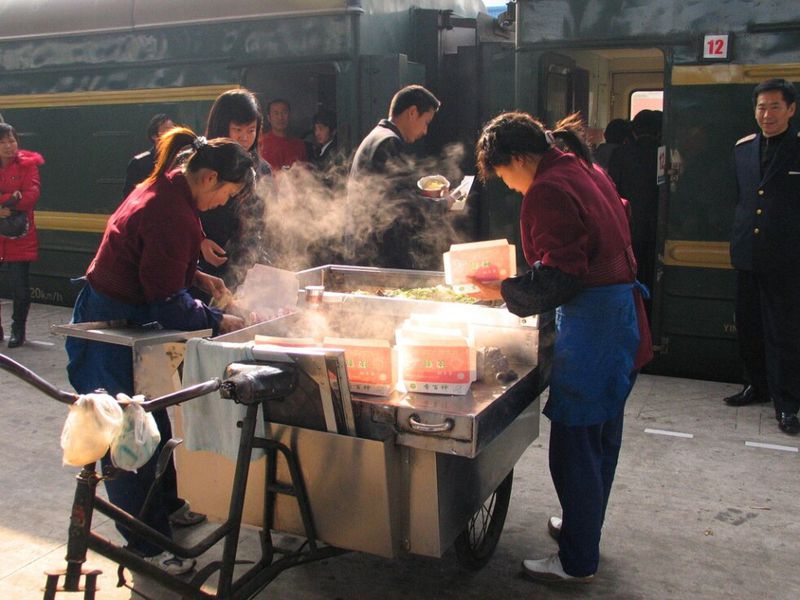
Vendors busy hawking their goods along the train platform (VCG)
The loudest in the group was this skinny young guy—it sounded like he had been working in the south. He said he’d done pretty well for himself, and had bought himself a new phone. It was the trendiest model at the time, a Motorola flip phone that cost maybe 4,000 kuai.
He was waving his phone around, showing off to the guys at his table. All of them were at least three rounds deep, and his voice kept getting louder and louder. The whole carriage could hear him. Then he fell asleep, and things quieted down for a bit. When he woke up, his phone was gone.
His phone was attached to his waist with an elastic cord, which had been neatly snipped—the work of a professional. Those green trains were full of thieves, and they made frequent stops. A pickpocket could have gotten off at any point, and there would be no way of investigating.
With his phone gone, he became a different man. He threw a childish fit, cursing the thief up and down before turning on the people around him. But they’d seen it all before, and didn’t argue, and soon everyone was drinking again. I don’t know if he had gotten over it or not, but he slammed a few more down. Finally he let out a few incoherent cries, slumped forward onto the table, and didn’t move again.
That’s when it became a problem. The train was already past Hohhot, and the guy was getting off at Baotou East, less than two hours away. As we approached the station, we yelled and yelled, but couldn’t wake him up.
The reaction from the other passengers became very interesting at that point. Everyone suddenly came together as a team. In order to get off, the man needed his luggage first, right? We put our heads together, and through the process of elimination, were able to locate his bags from the depths of the storage rack.
When we got to East Station, a few of the guys from his table helped him off the train, while others pulled open a window and yelled out his name. Nobody answered. Just imagine: it was winter in Inner Mongolia, bitterly cold; the wind cut like knives, and it was snowing to boot. In the end, they were afraid to leave him out there alone, so they brought him back into the train car.
Luckily, Baotou had two train stations, and the next one was still some ways away. We still had 30 or 40 minutes. Our mission was to pry open the drunkard’s mouth, get in touch with his family, and see him off the train before it went on to Yinchuan.
We finally managed to wrangle his younger brother’s phone number out of him, but this only led to another problem: How could we reach him without a phone? The big guys walked through the train car asking, “Anyone got a phone? Anyone got a phone?”
I was still thinking over everything that happened, when I suddenly had a moment of clarity. I raised my hand and said, “I have a phone!”
So we called up his brother with no further incident and arranged for him to wait at Baotou Station. After we got off, I got under one of the drunkard’s arms, and another man took the other, and we brought him toward the station exit. His whole body was trembling like a motor. He was starting to come around, and couldn’t stop thanking us.
What left the deepest impression on me was that carriage full of passengers, and the general atmosphere of the time.
The green trains of that era had their rough side—there was plenty of stealing and squabbling over seats—but there was also genuine kindness. Now, when you’re on the high-speed rail, your neighbors are always polite, but you don’t hear any more interesting stories. Now, any kind of exchange or connection is a rare and precious thing.
2
Love at First Sight
If I hadn’t gotten on that train, we wouldn’t have met, and we wouldn’t have come to know and love one another

(VCG)
Liu Dan: My name is Liu Dan, and I’m 33. I live in Shanghai.
Li Yankui: My name is Li Yuankui, and I’m 32. I work in software development.
LD: In 2013, I took the train from Nanjing back to Xinjiang, where I was working. I wasn’t able to get a sleeper ticket, so I had to sit on the hard seats for more than 40 hours. I met my husband on that train. He was in graduate school in Nanjing at the time, and was heading back to Xinjiang for Spring Festival.
LY: Spring Festival travel is really nerve-wracking. The whole train was packed tight—each row of seats was meant for six people, but, including people sitting in the aisles, there were sometimes 10 people to a row. After a while, I noticed a girl across the aisle, wearing one of those headbands that sweep all of your hair back. She was so beautiful. I took one look, and I couldn’t tear my gaze away.
LD: I was reading People’s Literature magazine, and he was reading a philosophy book. Maybe he noticed me because we were both reading. You know, he was still a student at the time, two years younger than me. He had this bookish aura about him. So at first I didn’t really notice him. The train ride seemed endless, with people constantly getting on and off, so he took the opportunity to switch over to my side.
LY: The train car emptied out a little after passing Zhengzhou. I saw that a few young Uyghur guys had squeezed in next to her, laughing and talking. I went over and said to one of them, “Make some space, will you? I’d like to sit here.” So I asked him to sit off to the side and I sat myself down next to my wife.
Then I started to chat with her. At first I was amazed that this young woman was going so far away for work—I thought it was rather romantic. That led into talking about books we liked, our hobbies, and so on.
LD: We talked about a ton of books. Pretty much everything I’d read, he had also read. It turned out that we shared many of the same viewpoints, and the words flowed like wine. He seemed so pure, so good, and so fascinating. Later, I told my mom, “I thought he had such clarity in his eyes. I think it could be wonderful to live out our lives together.”
LY: Of course she was beautiful, and laughed easily, and had a sunny and extroverted manner. And her voice was so lovely. I was smitten. She also kept sharing her snacks with me. That was when I knew I found her incredibly attractive.
LD: He kept eating my food for the whole trip—he said he didn’t get anything to eat. But he was considerate, getting water and standing in line for me.
By the time we were getting close to my stop, we were already reluctant to part. To be honest, I was very much into him by then. But we lived in different places, and he was still in school, and I felt a mental block about being an older woman. So I didn’t say much, and we only exchanged contact info. I figured having a friend to discuss books with would still be nice.
I didn’t think that, within a year, after seeing each other no more than 10 times, we would be getting married. Sometimes I feel that fate can be a mysterious and wonderful thing. If I hadn’t gotten on that train, we wouldn’t have met, and we wouldn’t have come to know and love one another.
LY: We really are lucky. I can only wonder at the ways of fate—the chances were truly infinitesimal.
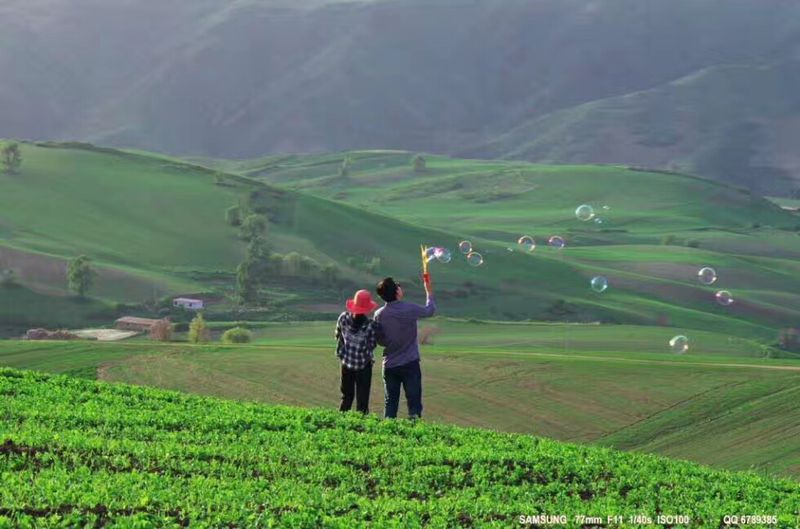
Liu Dan and Li Yuankui
3
Putting the “Haul” in Long-Haul Journey
But could we be in the mood to celebrate? Our hearts were set on paying off our debt as quickly as possible.
My name is Miao Huiling, and I’m 48. I’m a trucker’s wife, and I’ve been on the road with my husband for 17 or 18 years.
In 2006, we had just taken out a loan to buy a new truck, so the pressure was on. Ten or so days before Spring Festival, many trucks had already stopped running, so freight rates were very high—30 or 40 percent higher than usual. We decided to make a run, taking a load of fragrant pears from Korla, Xinjiang, to Fujian.
After celebrating Spring Festival Eve at home, we got on the road. Back then, highway tolls were waived between the first and third day of the New Year, so we wanted to take advantage of those three days to get the shipment down to Fujian.
After leaving Ningxia, we passed through Xi’an. It was an emotional sight. There were red lanterns all along the road, and as we drove past villages, we saw dragon dances and lion dances, happy crowds, and commotion. The highway was deserted, aside from our team of two freight trucks. The festivities were so homelike, and we felt so sick in our hearts. We sat in misery the whole way, neither of us talking.
But how could we be in the mood to celebrate? Our hearts were set on paying off our debt as quickly as possible
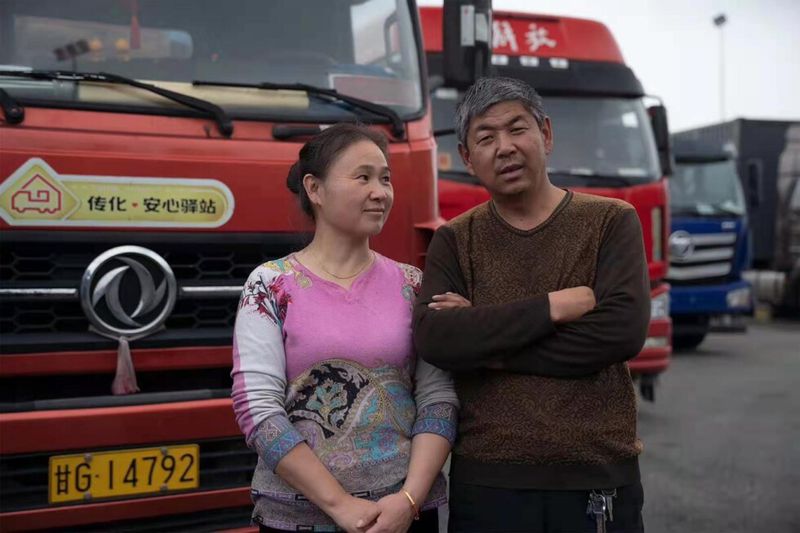
Miao and her husband, Lao Yang
The sun had just set when we were nearing Huangshi, Hubei. Another trucker from our town was driving up ahead. A black Passat sedan suddenly zoomed by, and looked like it was going to pass him as well. From behind, it looked like the car had lost control. Just then, it crashed into the highway barrier, spun out into another lane, and slammed into the other truck.
Even while braking as hard as possible, we still rear-ended them. We called the police right away, and they told us to find a spot to park in Huangshi, we’ll deal with the matter the next day.
All night, I couldn’t stop thinking about what happened. The car had a local plate, so I was afraid the police would take their side. The clock was also ticking on our cargo of pears. If we weren’t fast enough and missed the delivery deadline, we might not make a single cent from this trip.
Luckily, it all turned out to be a false alarm. The policeman turned out to be a decent guy. He dealt with us fairly and let us get on our way. We were able to deliver our cargo on time.
After unloading the shipment, we thought the parking lot was too expensive and far from the city, so we parked in an empty spot outside the market. Earlier in the night there had been high winds, which blew on the plastic packing material around and made lots of noise, but the rest of that night was uneventful.
The next day, when it was just barely light out, everything was still there. After the sun was all the way up, we went to take a look around. The battery on our new truck, which we bought only six months ago, had been stolen.
Worry, regret—what was the use? My husband and some others went over to the fruit wholesaler, while I walked around the market on my own and bought another battery. After it was installed, we drove the truck straight to the parking lot.
After the market reopened on the 6th or 7th, we loaded up a new cargo of fruit and headed back to Lanzhou. By the time we finished that trip and returned home, it was already the Lantern Festival.
It has been more than a decade, but I still can’t forget everything that happened on that trip. It still hurts to remember. From then on, we never ran shipments during the Spring Festival season. No matter how busy we are, once the 28th hits, we go back home to reunite with our family.
Translated by J.Y. Gan
Cover image from VCG







